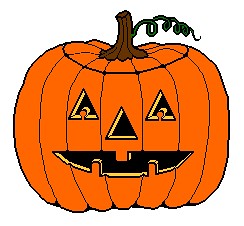Pumpkins: Everywhere: Why the Blair Witch story pales into insignificance

a deliteful Halloween to you
perhaps a scary one too
Our word "Halloween" comes to us as a contraction of the expression "All Hallows Evening," to mark the time prior to the day on the Church Calendar marked "All Hallows Day." The word "hallows" itself is an Old English term for "holy ones" or "saints" which latter derives from the Latin root-word for "holy" - "sanctus."
Protestants will note that Martin Luther published his 95 Theses on the church door at Wittenburg, where they were read first on October 31, the day and evening before All Saints Day. So, for Protestants, October 31 is also Reformation Day, as well as for many of us, the evening before All Saints Day - Halloween, the scariest nite of the year. It's a an interesting juxtaposition. However, among Protestants who delite in Halloween and at the same time wish to celebrate Reformation Day, I've never witnessed a Reformational Day church meeting (which usually takes place at nite) where the youth were decked out in costumes, either modest or bizarre. Now that would be a delite! Instead, we get a Reformation Day's nite offered as a complete alternative to the society's general observance of Halloween.
Martin Luther would have a great belly-laff at such a spectacular celebration of his theses, which were set out to launch a debate among scholars, but which were immediately translated from the scholarly language of his time, Latin, into the vernacular first of the Wittenberg German-speakers, but then of the everyday languages thru-out late Medieval European Christendom.
Why do I think Luther would enjoy the great costume party and its overflow into our church-hall Reformation Day assemblages. Why?
Well, you know, there's a Bible verse at work here. Luther knew his Bible, and would immediately recognize the text I have in mind, altho you can't find it among the partisan histories of Halloween that want to appropriate our festival into an entirely early-Medieval pagan framework - for the purpose of taking possession of anything Christian, and thus advancing the cause of Christianophobia.
Nevertheless, the Bible in one of the Gospels tells us:
"The graves were opened; and many of the bodies of holy folk which had slept now arose." (Matthew 27:52)These were the resuscitated bodies of many of the folks who had died, perhaps well before the time of Jesus. Their graves were opened, presumably by angels of God - during the dread time of three hours of darkness after Jesus had died and, according to the Apostles' Creed, "descended into Hell," and then three days later arose from the dead Himself. Meanwhile, after the graves were opened and the holy folk had arisen bodily from the sleep of death in cave-tombs where many had been embalmed, they remained in the vicinity for a while, until later, until after Jesus was buried, himself entombed, "descended into Hell, and the third day arose again from among the Dead." It was then that the holy folk who had arisen and awaited the Resurrection of Jesus, then themselves moved from the areas of the graves, tombs, cemetaries and went into Jerusalem, showing themselves to lots of people. And undoubtedly in rite good humour fritening those who saw them very much out of their wits! This is a Bible story of scary-kind humour slipped into the unrelenting cosmic-tragic narrative of the Crucifixion and Death story. The writer of this humourous vignette overlaps it into the post-resurrection narrative.
They came out of the graves after His resurrection, And went into the holy City, and appeared unto many." (Matthew 27:52,53)Christians - whether Catholic, Protestant, or Orthodox - did not simply appropriate for themselves a pagan costume-festival, rather they brawt with them an already-ancient story of their own, one that was intimate for many centuries already with the doctrine of the Communion of Saints, living and dead. We can add to the link with the Communion of Saints idea, a second one that bursts forth again in Luther's revived teaching of the Priesthood of All Believers, including the holy folk by faith who populated the Old Testament stories and the gravesites and cave-tombs thru-out Palestine.
So, have a deliteful Halloween this year, my dears, and a blessed Reformation Day, a blessed All Saints Day too. On the October 31, along with Halloween, remember the specifically-Protestant heritage (in costume, where permitted); and then observe All Saints Day which comes on the very next day on November 1, remember the Catholic Christian roots of all European Christendom, even the most Protestant and Reformational. It's a great time for reformational-ecumenical celebration, and getting scared out of your wits in a contained humourous festivity, while the actual world teems with horrors and news stories aplenty to thwart sleep in any case. - Anaximaximum
Evangelical Differences on Halloween


No comments:
Post a Comment